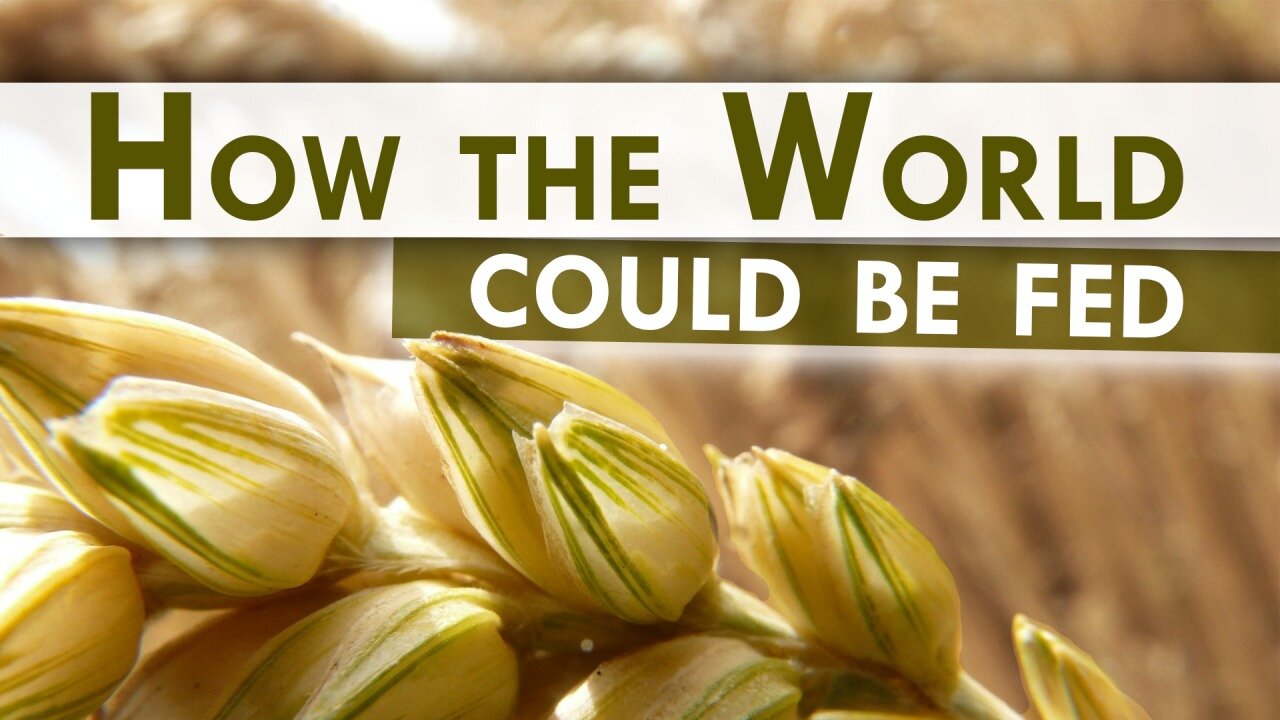Premium Only Content

How the world could be fed - sensational discovery now available again
In 2021, up to 828 million people were starving worldwide. One in ten people suffered from chronic hunger and every thirteen seconds, a child under the age of five dies as a result of starvation. According to Welthungerhilfe, the hotspots of hunger are in Sub-Saharan Africa and Southern Asia. But even in Europe, there is more and more talk of a looming food crisis. There are many reasons for this, ranging from wars and sanction policies, food speculation and corrupt governments to giant agribusinesses that control the market and crowd out small farmers.
But all this doesn’t have to be this way! There is an innovation in farming that only needs to be used. With the same amount of land and work, it promises significantly higher yields, and all without genetic engineering. The plants need little fertilizer, no pesticides and mature in less time. Wheat grows in clusters instead of just with one stalk, corn develops three to six cobs instead of one or two and the seeds remain in the hands of the user because it can germinate again. The farmers are therefore not dependent on seed suppliers, as is the case, for example, with the hybrid seeds marketed by Monsanto* [*now: Bayer AG] [= seeds that are hardly capable of germinating in the second year].
Since the mainstream media, after a few initial reports in the 1990s, no longer took up this topic, Kla.TV reported on it: [www.kla.tv/13397]:
The missing Primeval Code
"At the end of the 1980s, the Swiss researchers Dr. Guido Ebner and Heinz Schürch made a sensational discovery in the laboratories of the giant pharmaceutical Ciba-Geigy in Basel, now Novartis. In laboratory experiments, they exposed grain and fish eggs to an 'electrostatic field'. Result: Surprisingly, 'primeval forms' grew up. They were many times more resistant and productive than conventional or genetically modified plants or fish. They thrived without fertilizer and pesticides or medicines.”
As a leading manufacturer of chemical pesticides, Ciba-Geigy now found himself with a conflict of interest. Conclusion: The discovery rests in the drawers of the European Patent Office to prevent imitations outside the company." [www.kla.tv/13397]
By patenting this groundbreaking discovery, then-pesticide juggernaut Ciba-Geigy effectively owned the property and was able to prevent any further research in order to continue making profits from crop protection products and genetically modified crops.
But the story does not end here, thank God, because ten years later the patents became free again.
Daniel Ebner, biologist and son of one of the researchers, bought them and continued the research together with his brother Christoph Nikunja Ebner. Together they founded the Guido Ebner Institute to support and promote further research. They wanted to make their results available primarily in developing countries, because Western seed companies like Bayer are also raging there, making farmers dependent.
Since then, various studies and field trials have been carried out in Burkina Faso, Guatemala, Paraguay and Bavaria with wheat, corn, rice, potatoes, tomatoes, beans, soybeans, radishes, other plants and in fish farming. Further knowledge about the primeval effect was gained through these studies. Due to the shortened growth time of the plants, cultivation is also possible in areas of the world where it was previously difficult. These include, for example, the mountain plateaus or cold regions where the growing season is short. This will make other areas of the world previously almost deserted, habitable again. In other areas, two harvests per year will then be possible instead of just one.
In 2007, the Swiss investigative journalist Luc Bürgin wrote a book about this discovery so that the knowledge about the revolutionary operating principle of the so-called primeval code is not forgotten. In collaboration with Daniel Ebner, the book “Der Urzeit-Code: Die ökologische Alternative zur umstrittenen Gen-Technologie”” (English: The Primeval Code. The ecological alternative to controversial gene technology) has recently been published in its second edition.
In addition, the Guido Ebner Institute makes its accumulated knowledge available to farmers, garden plot holders and fish farmers for practical application. In this way, private individuals can also access this knowledge and acquire tools such as agricultural test containers, a green box for the garden or a fish box for fish breeders.
You can find the title of the book and the website of the institute in the sources.
The greed for profit and power of the agricultural corporations must be broken - so tell as many people as possible about this revolutionary discovery! Because the food supply of many people worldwide is currently in danger - although there is a way to significantly increase food production - WITHOUT genetic engineering!
from mmm.
Sources/Links:
Hunger in the world:
https://www.welthungerhilfe.de/hunger/
https://www.anonymousnews.org/meinung/russland-sanktionen-europas-selbst-gemachte-hungerkrise/
https://bruchsaler-friedensinitiative.de/2022/06/10/eu-verschaerft-hungerkrise-2/
www.kla.tv/7844
Bauernsterben in Europa
https://apolut.net/jean-ziegler-welthunger/
-
 13:37
13:37
Exploring With Nug
15 hours ago $6.60 earnedSUV Found Underwater Searching For Missing Man Jerry Wilkins!
64.6K4 -
 2:58:21
2:58:21
xBuRnTx
10 hours ago1st Warzone Stream Online
46.7K2 -
 6:10:21
6:10:21
JdaDelete
1 day ago $10.60 earnedDino Crisis - Sega Saturday
97.8K4 -
 23:22
23:22
MYLUNCHBREAK CHANNEL PAGE
1 day agoUnder The Necropolis - Pt 5
86.7K52 -
 2:26:11
2:26:11
Jewels Jones Live ®
2 days agoWINNING BIGLY | A Political Rendezvous - Ep. 108
146K44 -
 2:04:49
2:04:49
Bare Knuckle Fighting Championship
4 days agoBKFC FIGHT NIGHT MOHEGAN SUN FREE FIGHTS
74.3K7 -
 25:09
25:09
BlackDiamondGunsandGear
13 hours agoYou NEED to be Training For Whats to Come
51.2K11 -
 20:03
20:03
Sideserf Cake Studio
19 hours ago $1.81 earnedA HUNGRY HUNGRY HIPPOS CAKE THAT ACTUALLY WORKS?
48.1K14 -
 23:51
23:51
marcushouse
19 hours ago $1.64 earnedStarship’s Next Move Is Coming Sooner Than You Think!
35K6 -
 22:24
22:24
The Finance Hub
1 day ago $11.36 earnedBREAKING: JOE ROGAN JUST DROPPED A MASSIVE BOMBSHELL!!!
37.9K36